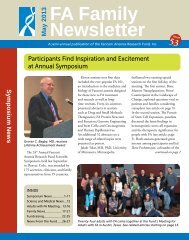- Page 1 and 2:
Fanconi Anemia: Guidelines for Diag
- Page 3 and 4:
We are deeply grateful to the follo
- Page 5 and 6:
iv Fanconi Anemia: Guidelines for D
- Page 7 and 8:
vi Fanconi Anemia: Guidelines for D
- Page 9 and 10:
8 Fanconi Anemia: Guidelines for Di
- Page 11 and 12:
10 Fanconi Anemia: Guidelines for D
- Page 13 and 14:
12 Fanconi Anemia: Guidelines for D
- Page 15 and 16:
14 Fanconi Anemia: Guidelines for D
- Page 17 and 18:
16 Fanconi Anemia: Guidelines for D
- Page 19 and 20:
18 Fanconi Anemia: Guidelines for D
- Page 21 and 22:
20 Fanconi Anemia: Guidelines for D
- Page 23 and 24:
22 Fanconi Anemia: Guidelines for D
- Page 25 and 26:
24 Fanconi Anemia: Guidelines for D
- Page 27 and 28:
26 Fanconi Anemia: Guidelines for D
- Page 29 and 30:
28 Fanconi Anemia: Guidelines for D
- Page 31 and 32:
30 Fanconi Anemia: Guidelines for D
- Page 33 and 34:
32 Fanconi Anemia: Guidelines for D
- Page 35 and 36:
34 Fanconi Anemia: Guidelines for D
- Page 37 and 38:
36 Fanconi Anemia: Guidelines for D
- Page 39 and 40:
38 Fanconi Anemia: Guidelines for D
- Page 41 and 42:
40 Fanconi Anemia: Guidelines for D
- Page 43 and 44:
42 Fanconi Anemia: Guidelines for D
- Page 45 and 46:
44 Fanconi Anemia: Guidelines for D
- Page 47 and 48:
46 Fanconi Anemia: Guidelines for D
- Page 49 and 50:
48 Fanconi Anemia: Guidelines for D
- Page 51 and 52:
50 Fanconi Anemia: Guidelines for D
- Page 53 and 54:
52 Fanconi Anemia: Guidelines for D
- Page 55 and 56:
54 Fanconi Anemia: Guidelines for D
- Page 57 and 58:
56 Fanconi Anemia: Guidelines for D
- Page 59 and 60:
58 Fanconi Anemia: Guidelines for D
- Page 61 and 62:
60 Fanconi Anemia: Guidelines for D
- Page 63 and 64:
62 Fanconi Anemia: Guidelines for D
- Page 65 and 66:
64 Fanconi Anemia: Guidelines for D
- Page 67 and 68:
66 Fanconi Anemia: Guidelines for D
- Page 69 and 70:
68 Fanconi Anemia: Guidelines for D
- Page 71 and 72:
70 Fanconi Anemia: Guidelines for D
- Page 73 and 74:
72 Fanconi Anemia: Guidelines for D
- Page 75 and 76:
74 Fanconi Anemia: Guidelines for D
- Page 77 and 78:
Chapter 4 Gastrointestinal, Hepatic
- Page 79 and 80:
78 Fanconi Anemia: Guidelines for D
- Page 81 and 82:
80 Fanconi Anemia: Guidelines for D
- Page 83 and 84:
82 Fanconi Anemia: Guidelines for D
- Page 85 and 86:
84 Fanconi Anemia: Guidelines for D
- Page 87 and 88:
86 Fanconi Anemia: Guidelines for D
- Page 89 and 90:
88 Fanconi Anemia: Guidelines for D
- Page 91 and 92:
90 Fanconi Anemia: Guidelines for D
- Page 93 and 94:
92 Fanconi Anemia: Guidelines for D
- Page 95 and 96:
94 Fanconi Anemia: Guidelines for D
- Page 97 and 98:
96 Fanconi Anemia: Guidelines for D
- Page 99 and 100:
98 Fanconi Anemia: Guidelines for D
- Page 101 and 102:
100 Fanconi Anemia: Guidelines for
- Page 103 and 104:
102 Fanconi Anemia: Guidelines for
- Page 105 and 106:
104 Fanconi Anemia: Guidelines for
- Page 107 and 108:
106 Fanconi Anemia: Guidelines for
- Page 109 and 110:
108 Fanconi Anemia: Guidelines for
- Page 111 and 112:
110 Fanconi Anemia: Guidelines for
- Page 113 and 114:
112 Fanconi Anemia: Guidelines for
- Page 115 and 116:
114 Fanconi Anemia: Guidelines for
- Page 117 and 118:
116 Fanconi Anemia: Guidelines for
- Page 119 and 120:
118 Fanconi Anemia: Guidelines for
- Page 121 and 122:
120 Fanconi Anemia: Guidelines for
- Page 123 and 124:
122 Fanconi Anemia: Guidelines for
- Page 125 and 126:
124 Fanconi Anemia: Guidelines for
- Page 127 and 128:
126 Fanconi Anemia: Guidelines for
- Page 129 and 130:
128 Fanconi Anemia: Guidelines for
- Page 131 and 132:
130 Fanconi Anemia: Guidelines for
- Page 133 and 134:
132 Fanconi Anemia: Guidelines for
- Page 135 and 136:
Chapter 7 Endocrine Disorders in Fa
- Page 137 and 138:
136 Fanconi Anemia: Guidelines for
- Page 139 and 140:
138 Fanconi Anemia: Guidelines for
- Page 141 and 142:
140 Fanconi Anemia: Guidelines for
- Page 143 and 144:
142 Fanconi Anemia: Guidelines for
- Page 145 and 146:
144 Fanconi Anemia: Guidelines for
- Page 147 and 148:
146 Fanconi Anemia: Guidelines for
- Page 149 and 150:
148 Fanconi Anemia: Guidelines for
- Page 151 and 152:
150 Fanconi Anemia: Guidelines for
- Page 153 and 154:
152 Fanconi Anemia: Guidelines for
- Page 155 and 156:
154 Fanconi Anemia: Guidelines for
- Page 157 and 158:
156 Fanconi Anemia: Guidelines for
- Page 159 and 160:
158 Fanconi Anemia: Guidelines for
- Page 161 and 162:
160 Fanconi Anemia: Guidelines for
- Page 163 and 164:
162 Fanconi Anemia: Guidelines for
- Page 165 and 166:
164 Fanconi Anemia: Guidelines for
- Page 167 and 168:
166 Fanconi Anemia: Guidelines for
- Page 169 and 170:
168 Fanconi Anemia: Guidelines for
- Page 171 and 172:
170 Fanconi Anemia: Guidelines for
- Page 173 and 174:
172 Fanconi Anemia: Guidelines for
- Page 175 and 176:
174 Fanconi Anemia: Guidelines for
- Page 177 and 178:
176 Fanconi Anemia: Guidelines for
- Page 179 and 180:
Chapter 9 Matched Sibling Donor Hem
- Page 181 and 182:
180 Fanconi Anemia: Guidelines for
- Page 183 and 184:
182 Fanconi Anemia: Guidelines for
- Page 185 and 186:
184 Fanconi Anemia: Guidelines for
- Page 187 and 188:
186 Fanconi Anemia: Guidelines for
- Page 189 and 190:
188 Fanconi Anemia: Guidelines for
- Page 191 and 192:
190 Fanconi Anemia: Guidelines for
- Page 193 and 194:
192 Fanconi Anemia: Guidelines for
- Page 195 and 196:
194 Fanconi Anemia: Guidelines for
- Page 197 and 198:
196 Fanconi Anemia: Guidelines for
- Page 199 and 200:
198 Fanconi Anemia: Guidelines for
- Page 201 and 202:
200 Fanconi Anemia: Guidelines for
- Page 203 and 204:
202 Fanconi Anemia: Guidelines for
- Page 205 and 206:
204 Fanconi Anemia: Guidelines for
- Page 207 and 208:
206 Fanconi Anemia: Guidelines for
- Page 209 and 210:
208 Fanconi Anemia: Guidelines for
- Page 211 and 212:
210 Fanconi Anemia: Guidelines for
- Page 213 and 214:
212 Fanconi Anemia: Guidelines for
- Page 215 and 216:
214 Fanconi Anemia: Guidelines for
- Page 217 and 218:
216 Fanconi Anemia: Guidelines for
- Page 219 and 220:
218 Fanconi Anemia: Guidelines for
- Page 221 and 222:
220 Fanconi Anemia: Guidelines for
- Page 223 and 224:
222 Fanconi Anemia: Guidelines for
- Page 225 and 226:
224 Fanconi Anemia: Guidelines for
- Page 227 and 228:
226 Fanconi Anemia: Guidelines for
- Page 229 and 230:
228 Fanconi Anemia: Guidelines for
- Page 231 and 232:
230 Fanconi Anemia: Guidelines for
- Page 233 and 234:
232 Fanconi Anemia: Guidelines for
- Page 235 and 236:
234 Fanconi Anemia: Guidelines for
- Page 237 and 238:
Chapter 12 Novel Treatment Options
- Page 239 and 240:
238 Fanconi Anemia: Guidelines for
- Page 241 and 242:
240 Fanconi Anemia: Guidelines for
- Page 243 and 244:
242 Fanconi Anemia: Guidelines for
- Page 245 and 246:
244 Fanconi Anemia: Guidelines for
- Page 247 and 248:
246 Fanconi Anemia: Guidelines for
- Page 249 and 250:
248 Fanconi Anemia: Guidelines for
- Page 251 and 252:
Chapter 13 Head and Neck Squamous C
- Page 253 and 254:
252 Fanconi Anemia: Guidelines for
- Page 255 and 256:
254 Fanconi Anemia: Guidelines for
- Page 257 and 258:
256 Fanconi Anemia: Guidelines for
- Page 259 and 260: 258 Fanconi Anemia: Guidelines for
- Page 261 and 262: 260 Fanconi Anemia: Guidelines for
- Page 263 and 264: 262 Fanconi Anemia: Guidelines for
- Page 265 and 266: Chapter 14 The Adult Fanconi Anemia
- Page 267 and 268: 266 Fanconi Anemia: Guidelines for
- Page 269 and 270: 268 Fanconi Anemia: Guidelines for
- Page 271 and 272: 270 Fanconi Anemia: Guidelines for
- Page 273 and 274: 272 Fanconi Anemia: Guidelines for
- Page 275 and 276: 274 Fanconi Anemia: Guidelines for
- Page 277 and 278: 276 Fanconi Anemia: Guidelines for
- Page 279 and 280: 278 Fanconi Anemia: Guidelines for
- Page 281 and 282: 280 Fanconi Anemia: Guidelines for
- Page 283 and 284: 282 Fanconi Anemia: Guidelines for
- Page 285 and 286: 284 Fanconi Anemia: Guidelines for
- Page 287 and 288: 286 Fanconi Anemia: Guidelines for
- Page 289 and 290: 288 Fanconi Anemia: Guidelines for
- Page 291 and 292: 290 Fanconi Anemia: Guidelines for
- Page 293 and 294: 292 Fanconi Anemia: Guidelines for
- Page 295 and 296: 294 Fanconi Anemia: Guidelines for
- Page 297 and 298: 296 Fanconi Anemia: Guidelines for
- Page 299 and 300: 298 Fanconi Anemia: Guidelines for
- Page 301 and 302: 300 Fanconi Anemia: Guidelines for
- Page 303 and 304: 302 Fanconi Anemia: Guidelines for
- Page 305 and 306: 304 Fanconi Anemia: Guidelines for
- Page 307 and 308: 306 Fanconi Anemia: Guidelines for
- Page 309: 308 Fanconi Anemia: Guidelines for
- Page 313 and 314: 312 Fanconi Anemia: Guidelines for
- Page 315 and 316: 314 Fanconi Anemia: Guidelines for
- Page 317 and 318: 316 Fanconi Anemia: Guidelines for
- Page 319 and 320: 318 Fanconi Anemia: Guidelines for
- Page 321 and 322: 320 Fanconi Anemia: Guidelines for
- Page 323 and 324: 322 Fanconi Anemia: Guidelines for
- Page 325 and 326: 324 Fanconi Anemia: Guidelines for
- Page 327 and 328: 326 Fanconi Anemia: Guidelines for
- Page 329 and 330: 328 Fanconi Anemia: Guidelines for
- Page 331 and 332: 330 Fanconi Anemia: Guidelines for
- Page 333 and 334: 332 Fanconi Anemia: Guidelines for
- Page 335 and 336: 334 Fanconi Anemia: Guidelines for
- Page 337 and 338: 336 Fanconi Anemia: Guidelines for
- Page 339 and 340: 338 Fanconi Anemia: Guidelines for
- Page 341 and 342: 340 Fanconi Anemia: Guidelines for
- Page 343 and 344: 342 Fanconi Anemia: Guidelines for
- Page 345 and 346: 344 Fanconi Anemia: Guidelines for
- Page 347 and 348: 346 Fanconi Anemia: Guidelines for
- Page 349 and 350: 348 Fanconi Anemia: Guidelines for
- Page 351 and 352: 350 Fanconi Anemia: Guidelines for
- Page 353 and 354: 352 Fanconi Anemia: Guidelines for
- Page 355 and 356: 354 Fanconi Anemia: Guidelines for
- Page 357 and 358: 356 Fanconi Anemia: Guidelines for
- Page 359 and 360: 358 Fanconi Anemia: Guidelines for
- Page 361 and 362:
360 Fanconi Anemia: Guidelines for
- Page 363 and 364:
362 Fanconi Anemia: Guidelines for
- Page 365 and 366:
364 Fanconi Anemia: Guidelines for
- Page 367 and 368:
366 Fanconi Anemia: Guidelines for
- Page 369 and 370:
368 Fanconi Anemia: Guidelines for
- Page 371 and 372:
370 Fanconi Anemia: Guidelines for
- Page 373 and 374:
372 Fanconi Anemia: Guidelines for
- Page 375 and 376:
374 Fanconi Anemia: Guidelines for
- Page 377 and 378:
376 Fanconi Anemia: Guidelines for
- Page 379 and 380:
378 Fanconi Anemia: Guidelines for
- Page 381 and 382:
380 Fanconi Anemia: Guidelines for
- Page 383 and 384:
382 Fanconi Anemia: Guidelines for
- Page 385 and 386:
384 Fanconi Anemia: Guidelines for
- Page 387 and 388:
386 Fanconi Anemia: Guidelines for
- Page 389 and 390:
388 Fanconi Anemia: Guidelines for
- Page 391 and 392:
390 Fanconi Anemia: Guidelines for
















